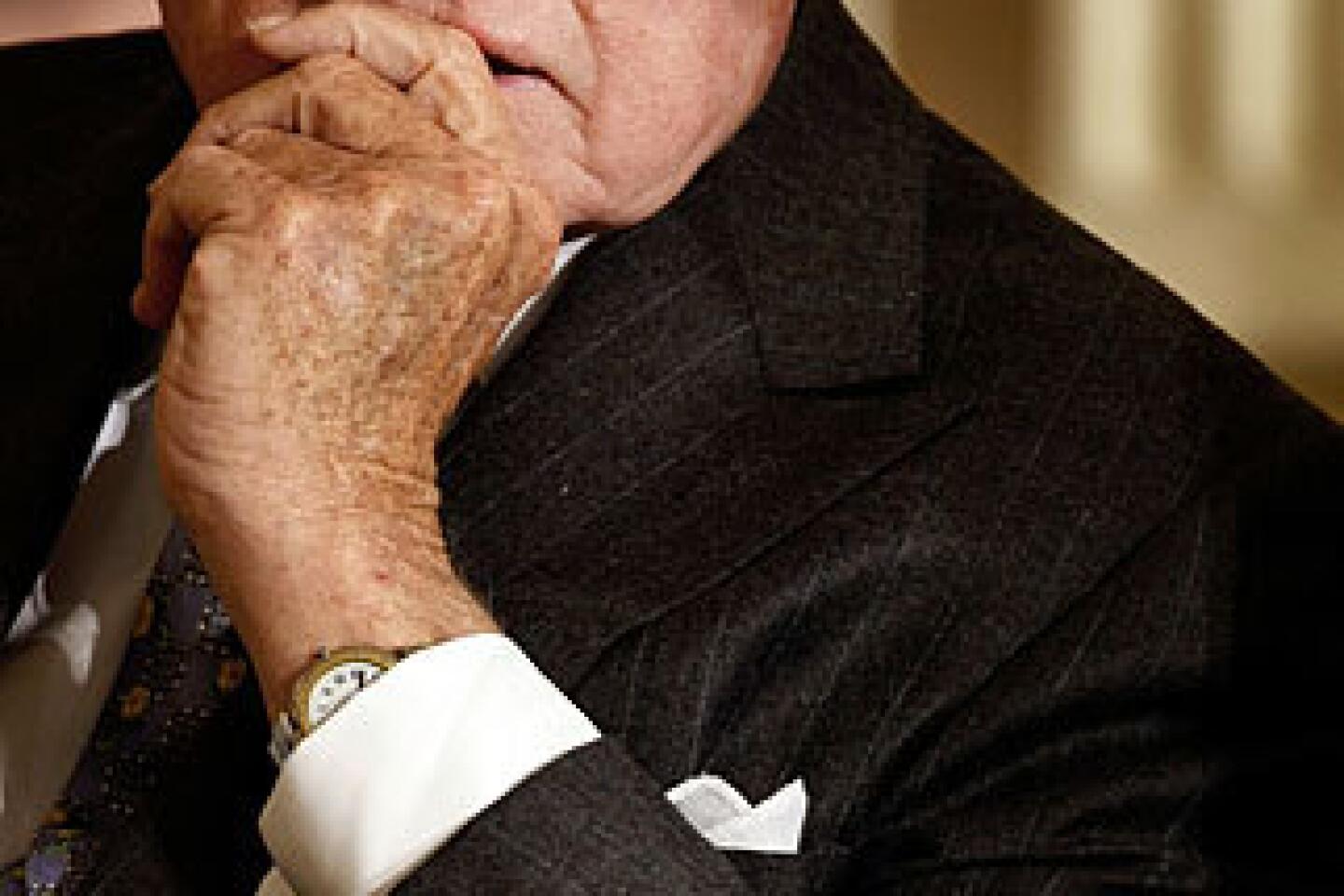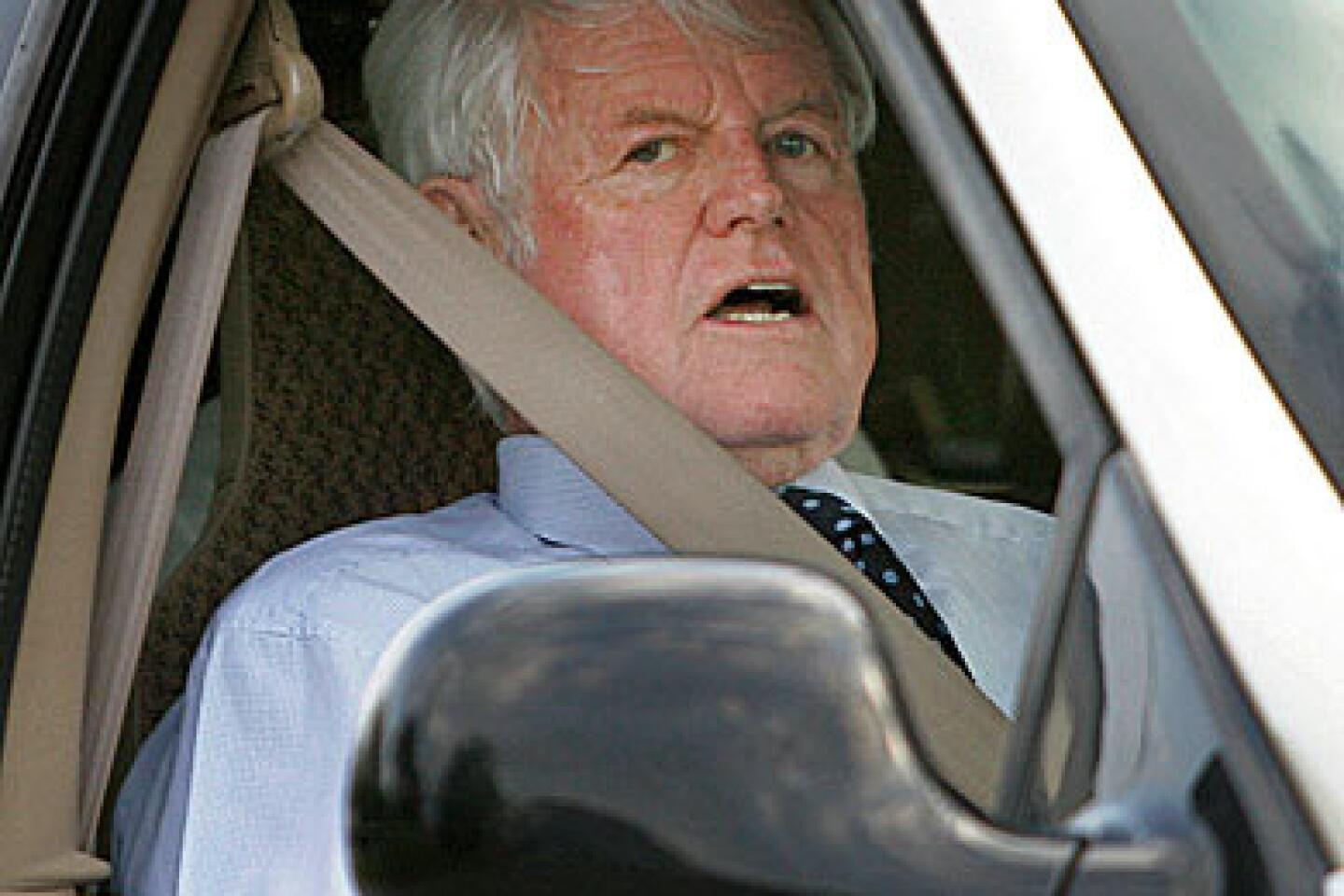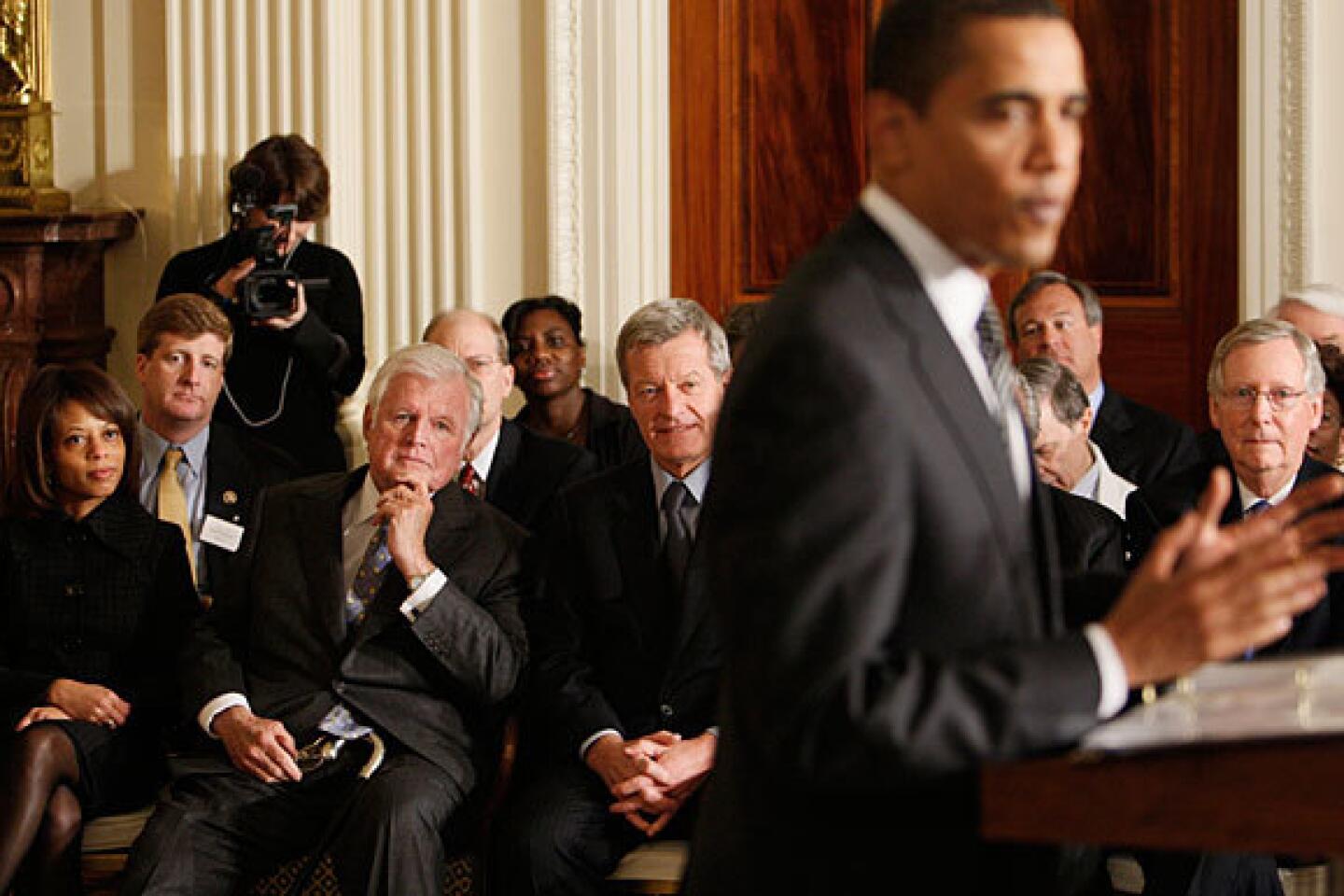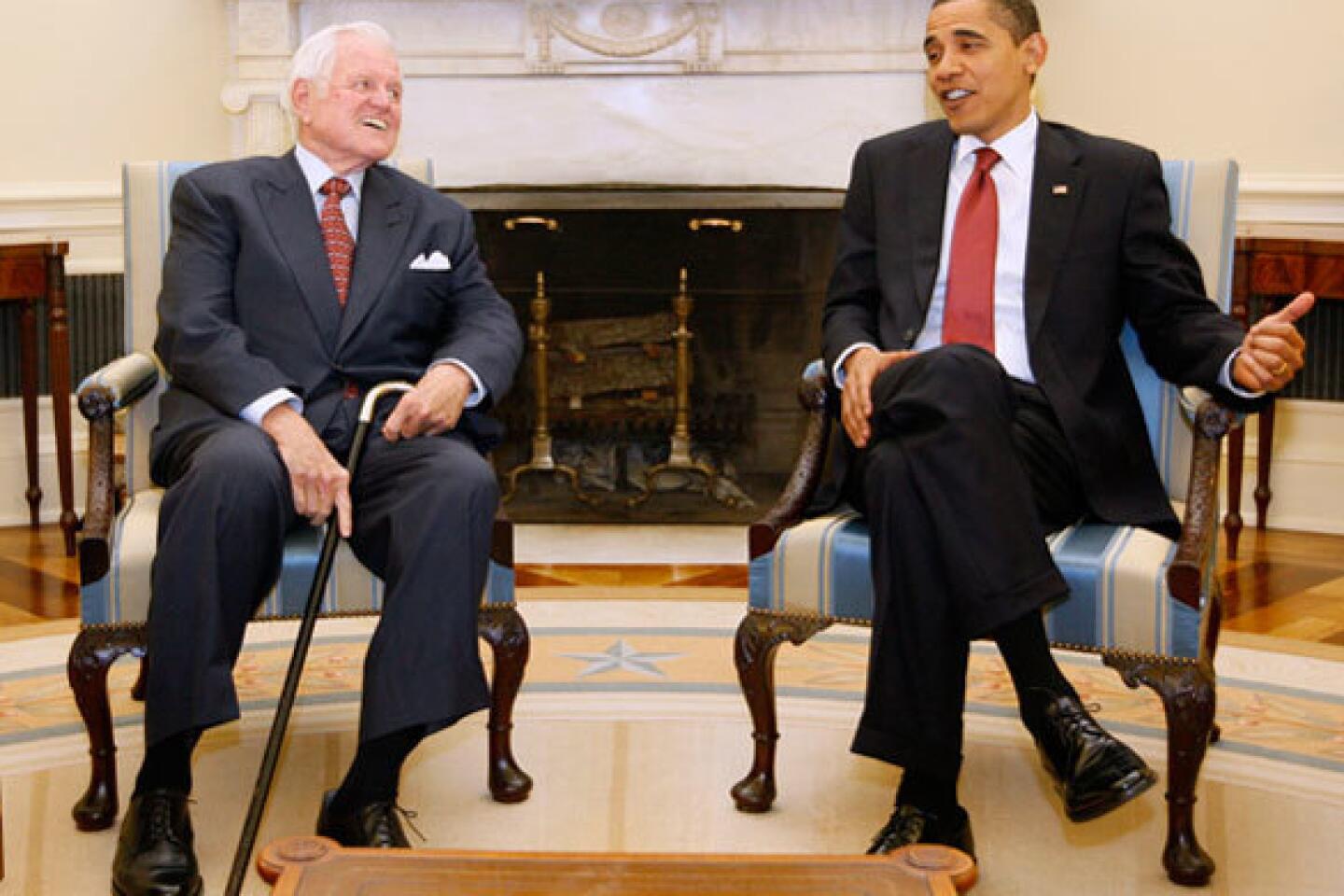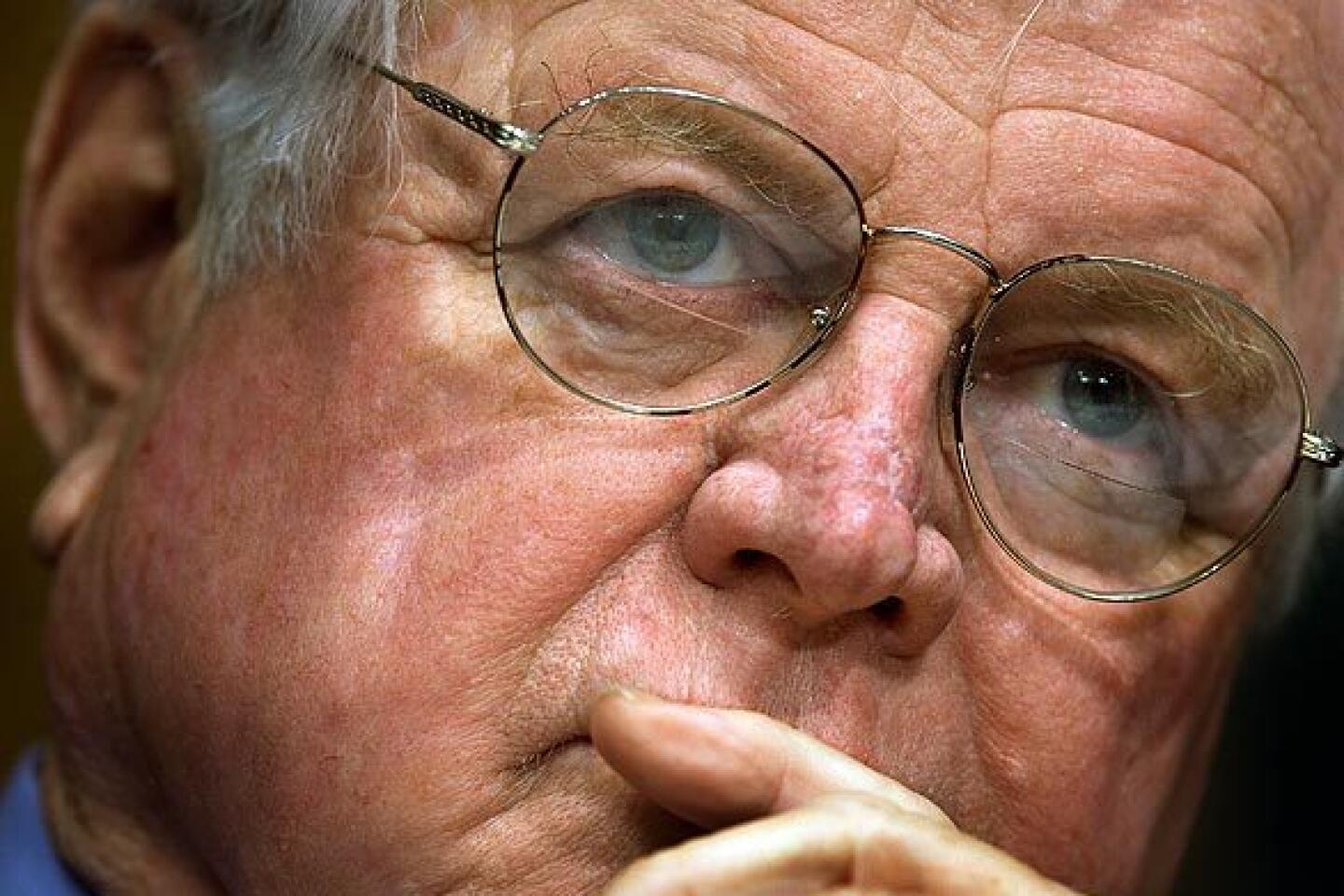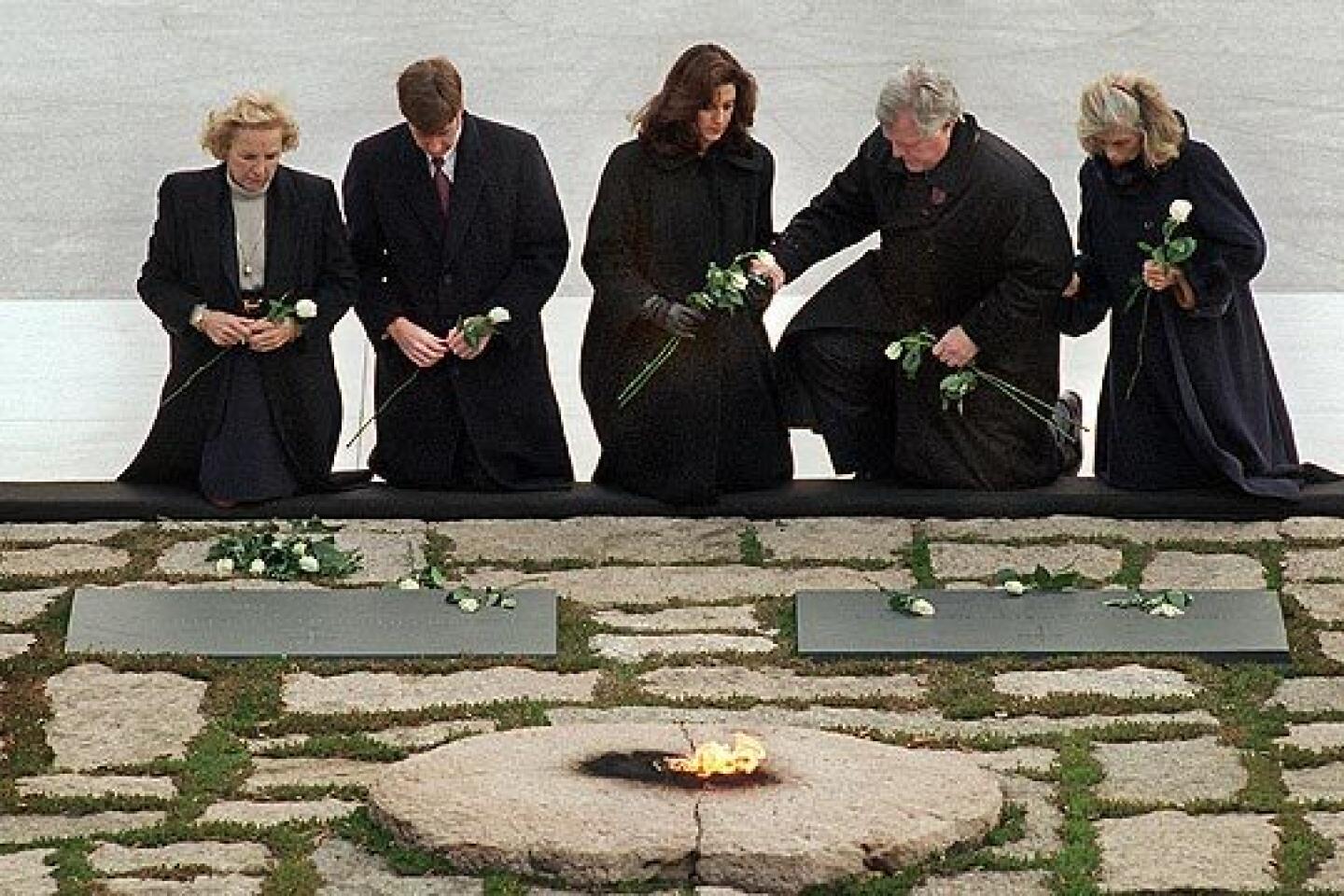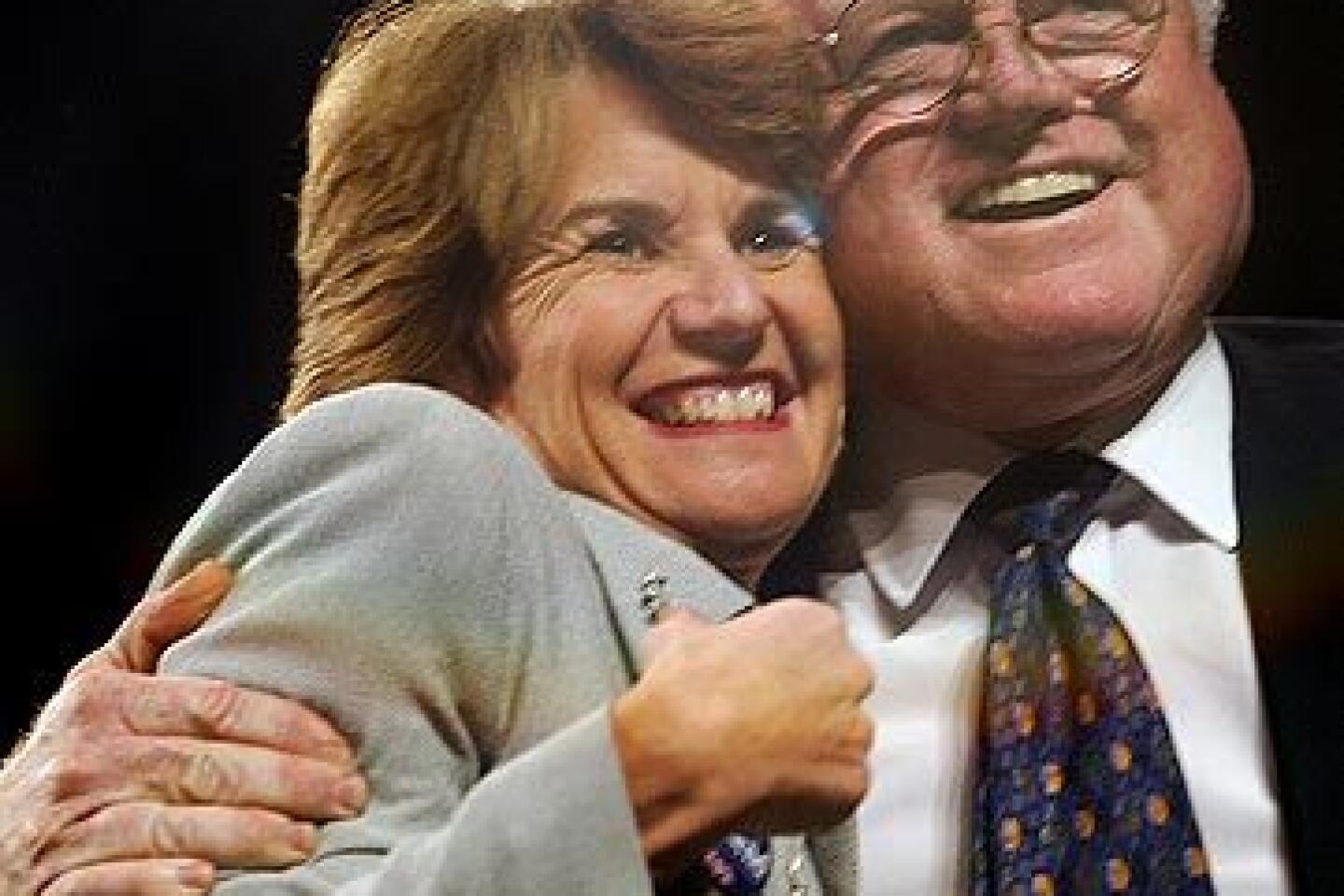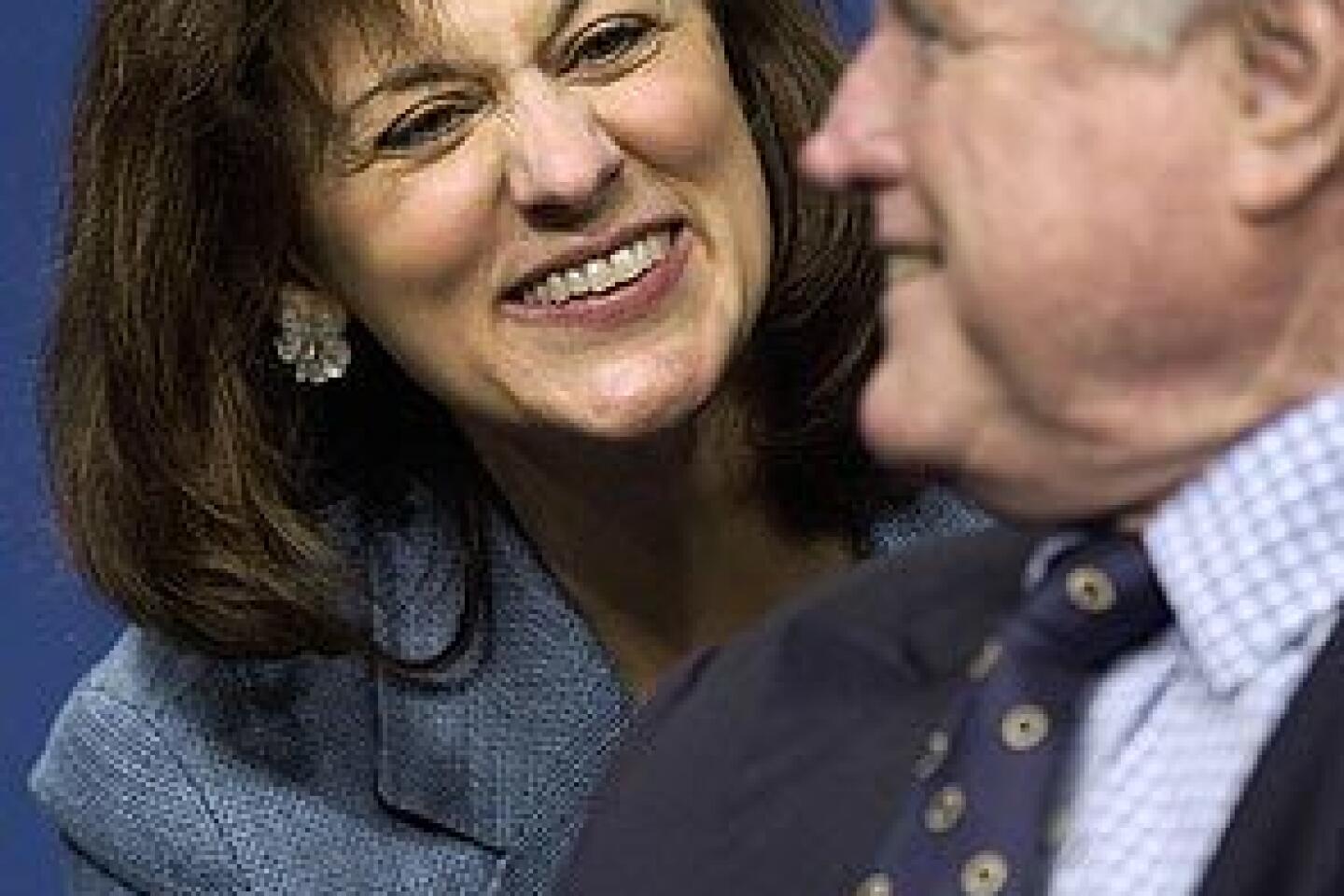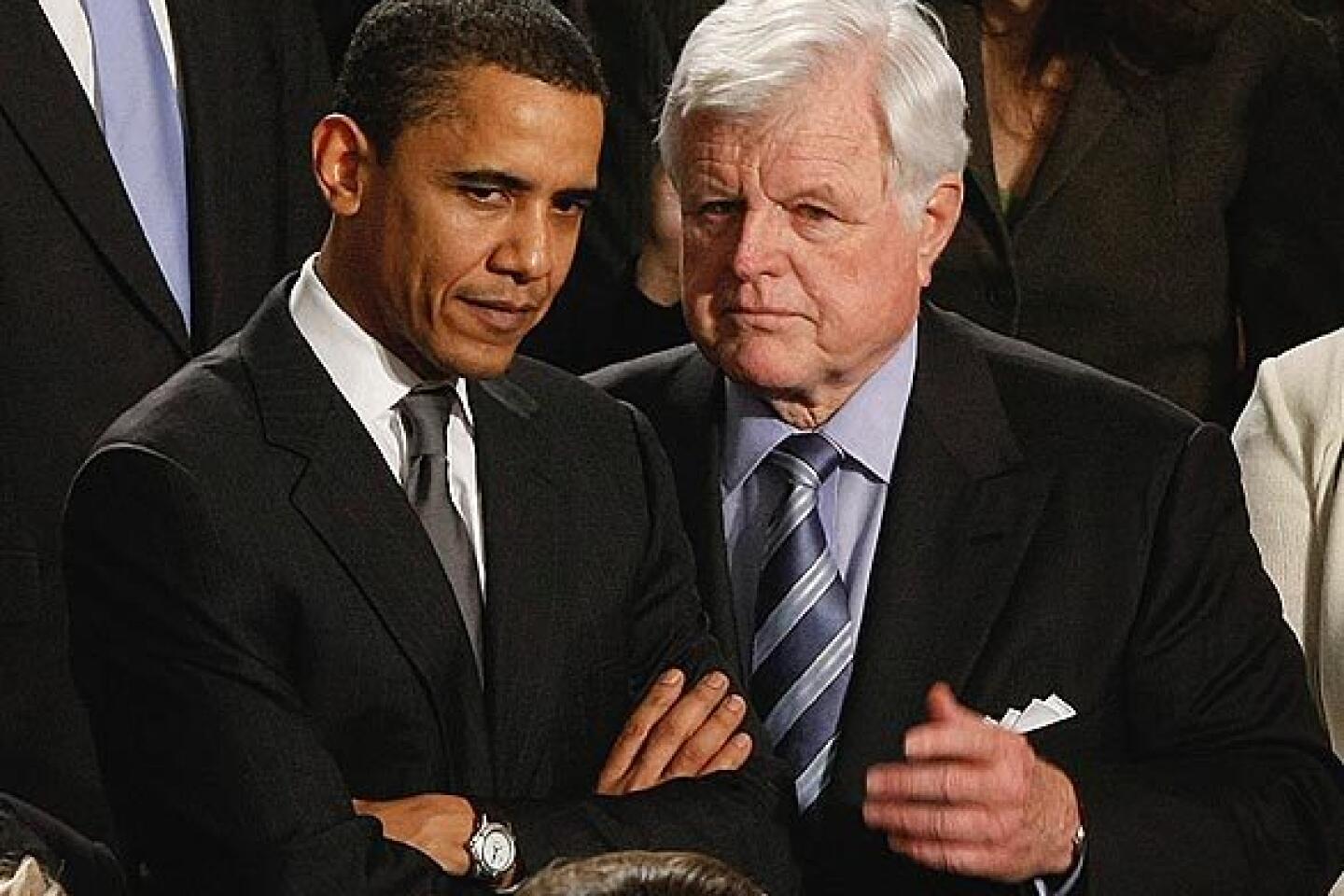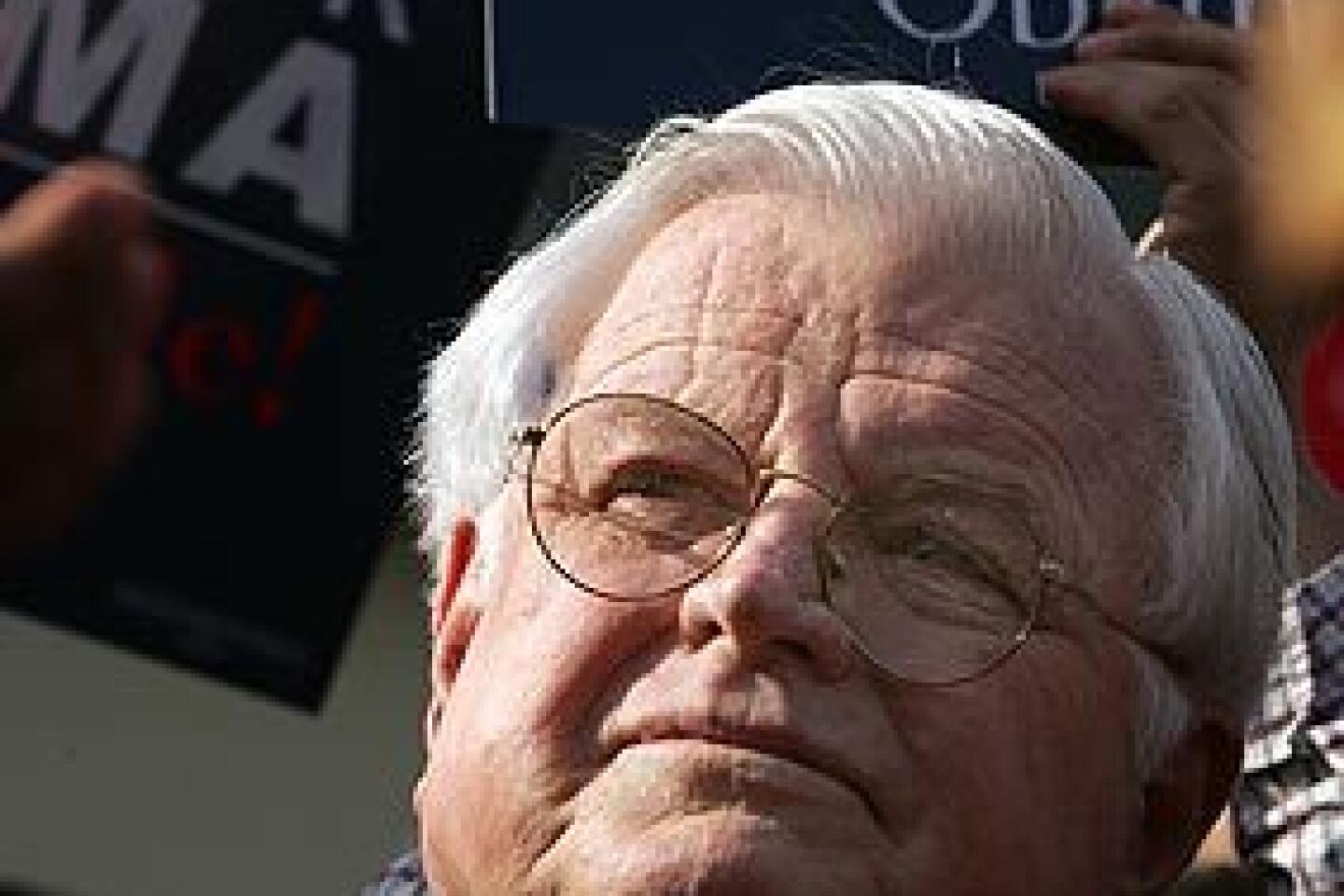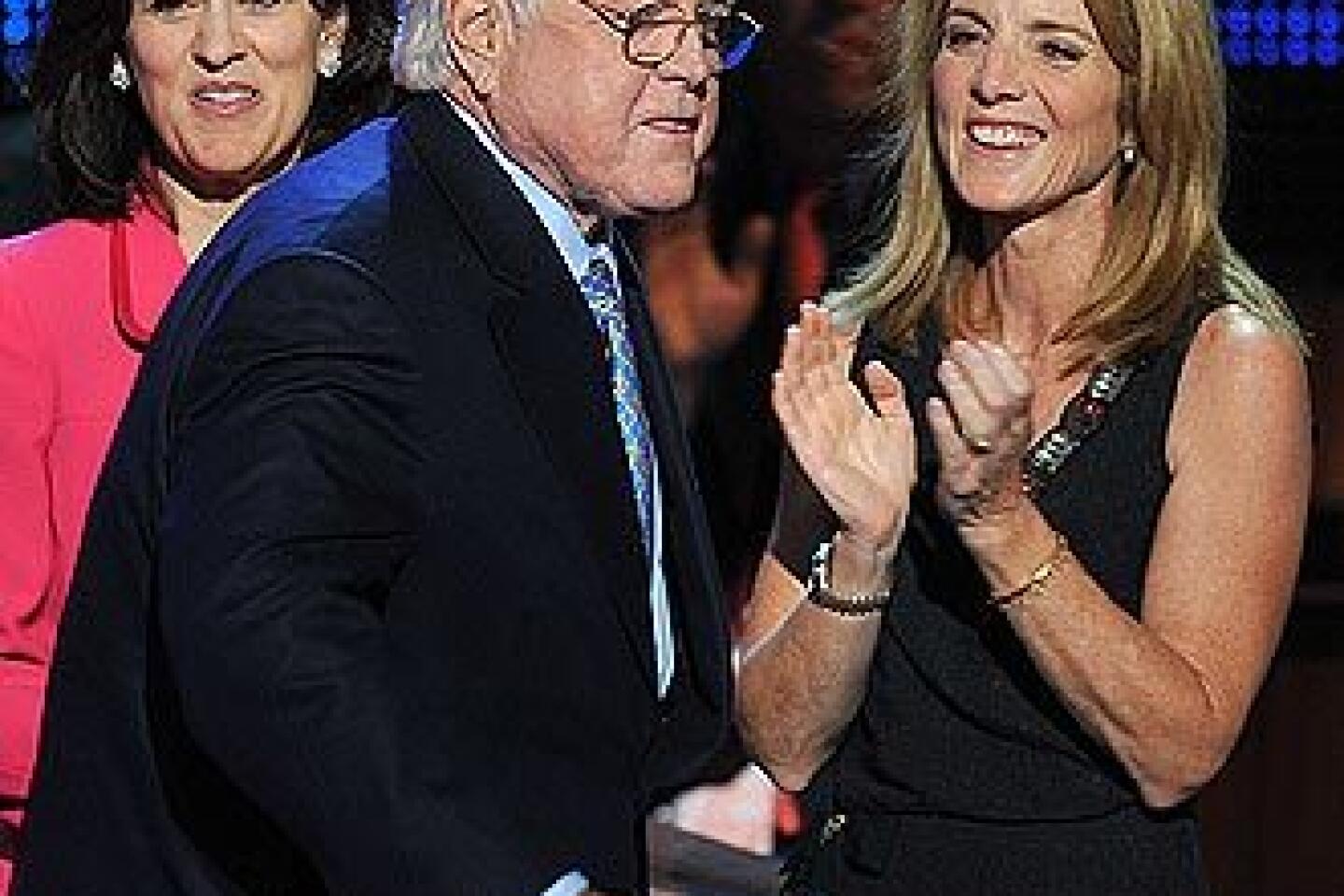Edward Kennedy dies at 77; ‘liberal lion of the Senate’
- Share via
Sen. Edward M. Kennedy, the Massachusetts Democrat and icon of American liberal politics who was the last surviving brother of a legendary political family, died late Tuesday at his home in Hyannis Port, Mass., his family announced. He was 77.
FOR THE RECORD:
Kennedy obituary: The obituary of Sen. Edward M. Kennedy (D-Mass.) that appeared in Wednesday’s Section A incorrectly reported that his oldest brother, Joseph P. Kennedy Jr., died when his airplane was shot down during World War II. The plane Joseph Kennedy was piloting over Europe was filled with explosives, which detonated before Kennedy and another crew member could bail out by parachute. The cause of the explosion was never conclusively determined. Additionally, the obituary said Edward Kennedy testified in the spring of 1991 at the trial of his nephew William Kennedy Smith, who was accused of rape. Kennedy took the stand in December 1991. Also, the article said Kennedy gave the eulogy at his brother Robert’s funeral in Washington; it was in New York City. —
Kennedy had been in declining health since having a seizure in May 2008. Subsequent tests determined that he had a malignant brain tumor.
Kennedy had not been to the Capitol since April, missing the passage in June of his groundbreaking measure to regulate tobacco. In July, he could not participate in the drafting of healthcare legislation in his role as chairman of the Senate Committee on Health, Education, Labor and Pensions.
He did not attend the funeral for his sister, Eunice Kennedy Shriver, who died Aug. 11, or a White House ceremony during which he was awarded a Presidential Medal of Freedom.
“We’ve lost the irreplaceable center of our family and joyous light in our lives, but the inspiration of his faith, optimism, and perseverance will live on in our hearts forever,” his family said in a statement.
A popular figure on both sides of the aisle in the Senate, Kennedy electrified his colleagues in July 2008 when he appeared briefly to vote on a measure to stave off a cut in Medicare fees to doctors who treat seniors, military personnel and their families and others. The measure passed on a 69-30 vote.
Kennedy was greeted with a wild reception from the party faithful in August 2008 on the first night of the Democratic National Convention in Denver. He addressed the gathering in a strong, steady voice, predicting that “this November, the torch will be passed to a new generation of Americans,” a reference to Illinois Sen. Barack Obama, who was elected president three months later. Kennedy’s endorsement of Obama in January 2008 was credited as an important validation of the senator’s bid to win the nomination against Sen. Hillary Rodham Clinton of New York.
“The Kennedy family and the Senate family have together lost our patriarch,” Harry Reid, the Senate’s Democratic leader, said in a statement.
Nancy Pelosi, speaker of the House, also expressed her sorrow in a statement. “Senator Kennedy had a grand vision for America, and an unparalleled ability to effect change,” she said.
As the standard-bearer for the liberal wing of the Democratic Party, the square-jawed “Ted” or “Teddy” Kennedy believed in government’s ability to help solve people’s problems, and over the decades he learned how to wield power in the Senate to move the government in that direction. He found numerous ways to work with Republican administrations and senators to fashion significant legislation on issues he cared deeply about.
Kennedy became a national figure after his brothers, President John F. Kennedy and presidential hopeful Sen. Robert F. Kennedy, were assassinated in the 1960s. Many Americans still yearned for a Kennedy who could occupy the White House, and they looked to the youngest of the Kennedy brothers to fulfill those hopes.
But his public image and political fortunes suffered an indelible stain on July 18, 1969, when he drove his Oldsmobile off a bridge into the water on Chappaquiddick Island in Massachusetts. He survived without serious injury, but his female passenger, 28-year-old Mary Jo Kopechne, died. In a lapse of judgment that was never fully explained, Kennedy sought the help of friends and advisors and delayed reporting the accident to police for 10 hours.
Nothing he did afterward could wipe out the public memory of that lapse. Though he filled his life with decades of work for progressive causes, and though he became the beloved patriarch of his large and often troubled family, his behavior following the incident at Chappaquiddick still held the power to stun.
Partly because of lingering questions about his actions and his relationship with Kopechne, Kennedy did not run for president in 1972 and 1976. In 1980, apparently believing that enough time had passed, he launched a fierce primary challenge against unpopular President Jimmy Carter that roiled the Democratic Party. Republican Ronald Reagan defeated Carter handily in the general election.
After that last foray into presidential politics, Kennedy concentrated his efforts on the Senate, becoming one of that body’s most effective members.
Though his most cherished legislative goal of universal health insurance eluded him, Kennedy helped write a number of laws that ranged from making it easier for workers who change or lose jobs to keep their health insurance, to giving 18-year-olds the right to vote, to deregulating the airlines, helping lower airfares.
He several times spearheaded legislation to raise the minimum wage and, in the early 1970s, wrote the law creating Meals on Wheels, which delivers meals to seniors. He was influential in reforming immigration laws and in expanding Head Start programs.
In 1982, he helped gain an extension of the 1965 Voting Rights Act, and he was a principal sponsor of the Civil Rights Act of 1991, which negated Supreme Court decisions that made it more difficult for minorities to win lawsuits charging job discrimination by employers. In 1990, he worked with then-Sen. Robert J. Dole (R-Kan.) to gain passage of the landmark Americans With Disabilities Act giving disabled Americans greater access to employment, among other things. That same year, he was author of the Ryan White Comprehensive AIDS Resources Emergency (CARE) Act providing funds for community healthcare and support services.
And every major education law passed since the 1960s bears Kennedy’s imprint, according to the National Education Assn., which gave Kennedy its highest award in 2000.
“Americans have so much affection for the Kennedy family, and they often fail to see past the legend and the celebrity,” the group’s then-president, Bob Chase, said at the time.
Through sheer energy and willingness to focus, Kennedy could challenge presidents and galvanize legislators of both parties around a given issue.
Following in the footsteps of his brother Robert, he was an early opponent of U.S. participation in the Vietnam War in the 1960s. In the 1970s, he criticized Carter’s energy policy. In 1987, he was central to the defeat of Reagan’s nomination of conservative Robert H. Bork to the Supreme Court, delivering a powerful denunciation of the president’s choice on the Senate floor. He also fought Reagan over cuts to social programs and, in 1989, Kennedy denounced President George H.W. Bush’s incursion into Panama to oust strongman Manuel Noriega.
In 1993, Kennedy worked with newly elected President Bill Clinton to gain passage of a bill to allow employees to take time off from their jobs to care for a newborn child or deal with a family illness. And in 2001, he teamed with newly elected President George W. Bush to gain passage of the No Child Left Behind legislation to strengthen educational standards through increased testing and other federal incentives to local school districts.
No matter if the Democrats were in the majority or the minority, Kennedy remained activist and outspoken, sometimes berating the GOP for not addressing social issues.
Once asked what his best quality was as a legislator, he answered: “Persistence.”
“He deserves recognition not just as the leading senator of his time, but as one of the greats in [the Senate’s] history,” New York Times reporter Adam Clymer wrote in his 1999 biography of Kennedy.
Sen. Orrin G. Hatch, the conservative Utah Republican who once described some of Kennedy’s legislation as “socialism in embryo,” said on the occasion of Kennedy’s 70th birthday celebration in 2002 that one of the reasons he had originally run for office was to get Kennedy out of office.
“As the past 26 years have amply indicated, I have failed, and I have come to appreciate that the country is better for it,” said Hatch, who over the years found common ground with Kennedy on education and health issues and even co-sponsored a bill to allow the creation of cloned embryos to provide stem cells under strict federal oversight.
Edward Moore Kennedy was born Feb. 22, 1932, in Brookline, Mass., to great wealth and even greater expectations. The youngest of nine children, he was the son of Joseph P. Kennedy Sr., a self-made millionaire who descended from Irish immigrants and rose to become the U.S. ambassador to Britain. Ted’s mother, Rose, was the daughter of John F. “Honey” Fitzgerald, a former Boston mayor.
Though Kennedy’s life was privileged, it was filled with tragedy almost from the beginning. When he was 12, his brother Joe Jr., a Navy pilot, was shot down over England during World War II. When he was 16, one of his sisters, Kathleen, died in a plane crash. Earlier, when he was 9, his mentally retarded sister Rosemary was sent to an institution; she died in 2005.
Kennedy went to Harvard University but as a freshman was expelled after having a friend take a Spanish exam for him.
This early indication of “blurred judgment,” Kennedy biographer Max Lerner wrote in 1980, set a pattern of “confusion, blunder, remorse, expiation, rebuilding, that was to be repeated on a larger canvas.” Significantly, Kennedy’s father was able to suppress the story from the newspapers until Ted ran for the Senate 11 years later.
After being expelled from Harvard, Kennedy enlisted in the Army, rising to private first class and winning an honorable discharge in 1953. He was accepted back at Harvard and graduated in 1956. He graduated from law school at the University of Virginia three years later.
Kennedy plunged into politics almost immediately, serving as campaign director for the Rocky Mountain states in John Kennedy’s 1960 drive for the presidency.
He then took a job as assistant district attorney in Suffolk County, Mass., and, in 1962, he ran against a prominent Democrat, state Atty. Gen. Edward McCormack, for the unexpired Senate term vacated when JFK won the presidency.
The campaign gave the younger Kennedy his first brush with political hardball: McCormack, a veteran politician and nephew of House Speaker John W. McCormack, portrayed his challenger as a lightweight who was trading on his family name.
“If your name was [merely] Edward Moore [instead of Edward Moore Kennedy], your candidacy would be a joke,” McCormack told him during a debate.
But Kennedy’s name was Kennedy, and he won the primary. He went on to beat Republican George Cabot Lodge, the son of former Sen. Henry Cabot Lodge Jr.
Kennedy arrived in the chamber at age 30, the minimum age required for a senator.
With one brother in the White House and another, Robert, as U.S. attorney general, it was not out of the realm of possibility at the time that there could be a run of three successive Presidents Kennedy.
Then came Nov. 22, 1963.
Kennedy was in Washington when he received word that the president had been shot to death in Dallas. It was the beginning of another string of tragedies for the family.
On June 19, 1964, a private plane flying Kennedy from Washington to Springfield, Mass., crashed, killing an aide and the pilot. Kennedy sustained a broken back, forcing him to campaign for his first full Senate term from a hospital bed. He won the election with almost 75% of the vote.
Then, on June 5, 1968, his brother Robert, then a New York senator, was shot at the Ambassador Hotel in Los Angeles on the night that he won the California Democratic presidential primary; he died the next day. Kennedy delivered an eloquent, often-quoted eulogy at the funeral in Washington, praising his brother in a breaking voice as “a good and decent man, who saw wrong and tried to right it, saw suffering and tried to heal it, saw war and tried to stop it.”
After Richard M. Nixon narrowly won the presidency in 1968, Kennedy became the early favorite to mount a challenge four years later.
The accident at Chappaquiddick the following year crushed those ambitions. As Lerner wrote in “Ted and the Kennedy Legend: A Study in Character and Destiny” (1980), this self-inflicted wound, more than any other event, “blocked his path to the White House, called his credibility into question and damaged the Kennedy legend.” Kennedy had flown to Chappaquiddick that July 18 to sail in a regatta and later throw a party for six young women who had worked in Robert Kennedy’s presidential campaign. Chappaquiddick is near Martha’s Vineyard, an island off the Massachusetts coast.
According to an account given by Kennedy in a televised speech carried nationwide a week after the accident, the party went on until the early hours. Kopechne, one of the campaign aides, wanted to go back to Martha’s Vineyard, where the group was staying. Kennedy volunteered to drive her to the ferry.
But, Kennedy recounted, he took a wrong turn and drove the car off a narrow wooden bridge and into a tidal pond. The car toppled over on its roof. Kennedy said he tried to rescue Kopechne and that he had suffered a “cerebral concussion as well as shock” in the accident, which might explain “the various inexplicable, inconsistent and inconclusive things I said and did,” including his failure to notify authorities for 10 hours. This delay, he said, was “indefensible.”
This explanation, doubted by many, came after Kennedy had been in seclusion for several hours after the accident with a large number of political and legal advisors. At the same time he made his statement, Kennedy also announced that he was pleading guilty to leaving the scene of an accident, for which he received a suspended two-month jail sentence and had his driving license taken away for a year. He put his political fate in the hands of his constituents.
The incident marked, as President Nixon privately gloated at the time, “the end of Teddy,” at least as a viable presidential foe. “That will be around his neck forever,” Nixon later told his White House chief of staff, H.R. Haldeman.
Kennedy surprised many by easily winning reelection to the U.S. Senate in Massachusetts in 1970, albeit by a smaller margin than in 1964.
But, as Nixon predicted, Chappaquiddick would curtail further presidential aspirations, as his most serious attempt in the 1980 Democratic primary contest finally made clear.
Kennedy had tangled repeatedly with Carter over national health insurance and energy policy, but the decision to mount a liberal challenge to an incumbent Democrat was nevertheless startling.
And from the start, it was clear that Kennedy had miscalculated, that questions about Chappaquiddick would not go away.
Although he stayed in the race until the very end, he could claim nothing more than having damaged Carter’s chances against Reagan.
Kennedy turned his talents to the Senate. A master legislator, he seemed to reach his full potential in his continued efforts to champion the poor, abused and deprived. When his party was out of power in the Senate, Kennedy adjusted to being a member of the minority and, backed by one of the best congressional staffs in Washington, was able to get things done that others could not.
For example, in 1996, working in tandem with Sen. Nancy Kassebaum (R-Kan.), he pushed through legislation that guaranteed Americans the right to buy health insurance and limited the length of time that an insurer could deny coverage for a specific “preexisting” medical condition.
Also in 1996, Kennedy spearheaded legislation to raise the minimum wage, achieved largely because of his willingness to couple that liberal cause with a package of business tax cuts that Republicans favored.
In 1999, he sponsored and passed legislation to allow the handicapped to work without losing Medicaid health benefits. And he was one of the Senate authors of the “patients’ bill of rights.”
Though in 2000 he worked with President George W. Bush on strengthening education standards, Kennedy did not abandon the frayed banner of liberalism. In early 2002, he was one of only a handful of Democrats to openly call for repeal of parts of the Bush tax cuts enacted the previous year.
In the end, he would live decades longer than his brother John, who died at 46, and his brother Robert, who died at 42. Before and after his 24-year marriage to Joan Bennett ended in 1983, Kennedy had a well-earned reputation for drinking and carousing with women. In the spring of 1991, he was forced to testify in the trial of his 30-year-old nephew, William Kennedy Smith, who was charged with having raped a woman near the family beach house in Palm Beach, Fla., after a late-night drinking bout with his Uncle Ted at a local bar. Smith, the son of Kennedy’s sister Jean and her late husband, Stephen Smith, was acquitted.
In October 1991, Kennedy made a public apology of sorts at the John F. Kennedy School of Government at Harvard, in which he said he recognized “the faults in the conduct of my private life.”
“I realize that I alone am responsible for them, and I am the one who must confront them,” he said. Unlike his brothers, he said, he had been given “length of years and time,” and he said he was determined “to give all that I have to advance the causes for which I have stood for almost a third of a century.”
In 1992, Kennedy married Washington lawyer Victoria Reggie, a move that friends said settled and re-energized him. The 6-foot-2 senator kept more conventional work hours while also stepping up his work pace in the Senate.
“People measure me against my brothers’ ‘performance,’ ” Kennedy said in a 1983 New York Times interview. “It’s always been with me. But I like to believe that during the time I’ve been in the Senate that I’ve made some contribution. I take some satisfaction in that. My brothers were very much their own people. I like to think that I’m my own man.”
Besides his wife, Kennedy is survived by his daughter, Kara Kennedy Allen, his son Edward Jr. and another son, Patrick, who followed his father into politics, serving in the House representing Rhode Island. Kennedy also is survived by grandchildren and sister Jean Kennedy Smith.
Luther is a former Times staff writer and editor.
More to Read
Start your day right
Sign up for Essential California for the L.A. Times biggest news, features and recommendations in your inbox six days a week.
You may occasionally receive promotional content from the Los Angeles Times.
